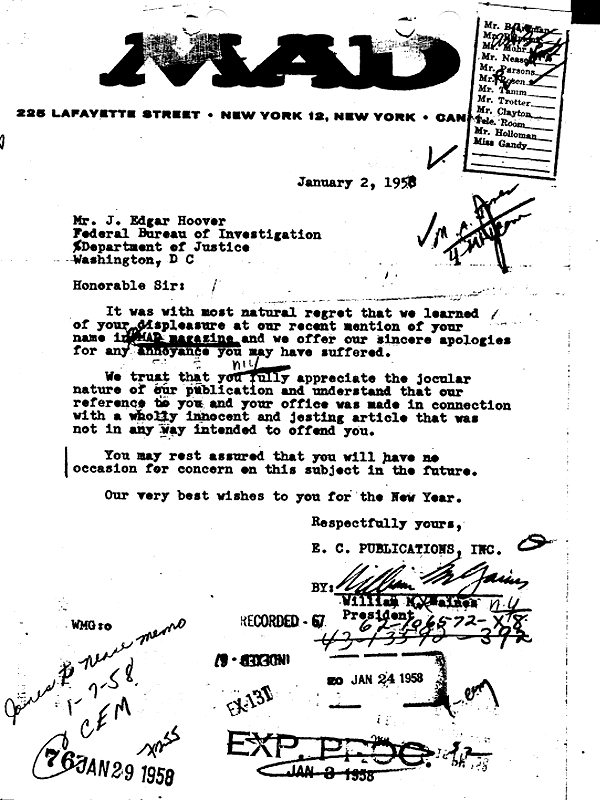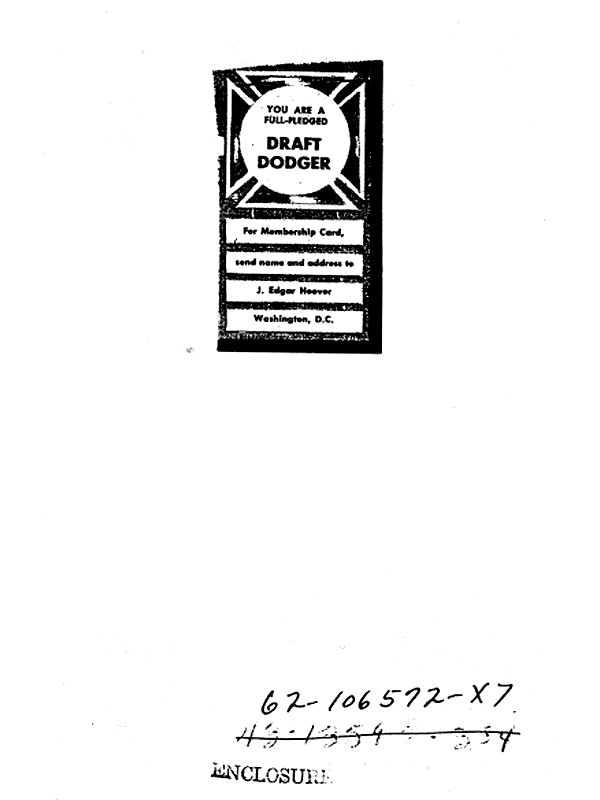
Many of us grew up reading MAD, the soon-to-be-late illustrated satirical magazine. But only the generations who went through their MAD periods in the publication's first couple of decades, from the 1950s through the 1970s, enjoyed it at the height of its subversive powers. As hard as it may be to imagine in the 21st century, there was even a time when MAD came under scrutiny by no less powerful an organization than the United States Federal Bureau of Investigation, and faced the wrath of its first and most feared director J. Edgar Hoover at that. But did the heat stop its creators from doing their necessary work of irreverence? Most certainly not.
"In a memo dated November 30, 1957," writes Mental Floss' Jake Rossen, "an agent with the Federal Bureau of Investigation identified as 'A. Jones.' raised an issue of critical importance." That issue had to do with what the FBI file on the case described as several complaints made "concerning the 'Mad' comic book," and specifically "a tongue-in-cheek game about draft dodging. Players who earned such status were advised to write to FBI Director J. Edgar Hoover and request a membership card certifying themselves as a 'full-fledged draft dodger.' At least three readers, the agent reported, did exactly that." Agent Jones also weighed in with a judgment of MAD itself: "It is rather unfunny.”

You can see all this for yourself in the documents from the FBI file, excerpts of which are available to download at thesmokinggun.com. "Criticizing or lampooning the FBI has become standard media fare," says that site, "but when J. Edgar Hoover ran the joint, the bureau wouldn't stand for such swipes — and often retaliated by investigating its foes. So that's why it's great to see that MAD magazine wasn't intimidated by Hoover and seemed to take pleasure in needling the Director." It did it again in 1960, two years after publisher William Gaines promised never to mention Hoover's name in the pages of MAD, when it made fun of the FBI's top man twice in a single issue, once in a faux advertisement for a vacuum cleaner called “The Honorable J. Edgar Electrolux.”
The exchanges that ensued, says thesmokinggun.com, reveal the FBI's possession of "one lousy sense of humor." But they also reveal no small degree of courage on the part of a still-new humor magazine in the face of an intelligence organization more than empowered to seriously disrupt lives and careers. Not long thereafter, MAD would become a recognized American institution in its own way, poking fun at seemingly every phenomenon to pass, however ephemerally, through the national zeitgeist. But now that its own run, which adds up to a highly non-ephemeral 67 years, has come to an end, we'd do well to reflect on what its history tells us about satire and the state. The condition of that dynamic today may cause some of us to do just what MAD mascot Alfred E. Neuman never did — worry.
via Mental Floss
Related Content:
The End of an Era: MAD Magazine Will Publish Its Last Issue With Original Content This Fall
FBI’s “Vault” Web Site Reveals Declassified Files on Hemingway, Einstein, Marilyn & Other Icons
Read 113 Pages of Charles Bukowski’s FBI File From 1968
The Existentialism Files: How the FBI Targeted Camus, and Then Sartre After the JFK Assassination
Who Was Afraid of Ray Bradbury & Science Fiction? The FBI, It Turns Out (1959)
Based in Seoul, Colin Marshall writes and broadcasts on cities, language, and culture. His projects include the book The Stateless City: a Walk through 21st-Century Los Angeles and the video series The City in Cinema. Follow him on Twitter at @colinmarshall, on Facebook, or on Instagram.
When MAD Magazine Ran Afoul of the FBI By Name-Checking J. Edgar Hoover Not Once But Three Times is a post from: Open Culture. Follow us on Facebook, Twitter, and Google Plus, or get our Daily Email. And don't miss our big collections of Free Online Courses, Free Online Movies, Free eBooks, Free Audio Books, Free Foreign Language Lessons, and MOOCs.
from Open Culture https://ift.tt/2Lbi4qY
via Ilumina
Comments
Post a Comment